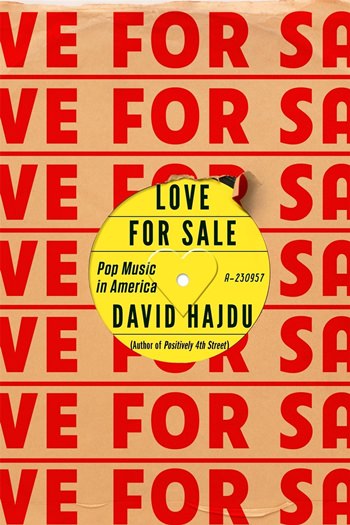“Love for Sale: Pop Music in America” by David Hajdu (Farrar, Straus and Giroux)
Ever wonder what makes pop music so irresistible? David Hajdu, a music critic and professor at Columbia’s School of Journalism, has spent a long time thinking about the question.

In “Love for Sale,” he explores the combination of luck, talent and hard work that goes into making a hit: this “product of mass culture that reaches millions of people … at one time and works for each person in a personal way.”
He begins his story in the 19th century with the cultural changes wrought by the widespread publication of sheet music and continues on into the 20th and 21st centuries with the rise of new music-making technologies: Tin Pan Alley, recordings, MTV and digitization.
Along the way he pauses to explore the significance of the Cotton Club, Billboard charts and transistor radio, and analyzes the complex roots of rock ‘n’ roll and a half-dozen other musical genres.
For the most part, it’s an exhilarating read, though not surprisingly for such a self-described music nerd, Hajdu is prone to digress and never misses the chance to untangle the convoluted genealogy of a song.
A little more than halfway through, he makes a startling confession: He has a “soft spot” for monaural sound. “The way I feel about it cannot be wholly explained as the fetishistic glamorization of archaic technology that typically afflicts geeks like me,” he notes wryly.
Rather, it’s because he can’t process stereo sound well, the result of hearing loss he suffered in his youth from falling asleep night after night with one ear glued to his beloved transistor radio.
Similar reminiscences throughout the text serve to establish his musical bona fides and make this more lively and personal than a standard historical survey. He’s both critic and fan.
He ends with a touching coda on the difference between his musical taste as a youthful boomer and that of his teenage son, whose playlists include such contemporary artists as Jeremih, Natalie La Rose and Kid Ink.
Hajdu admits to liking quite a few of the songs but hiding his enthusiasm because he doesn’t want to destroy for his son the signature experience of all great pop music — the way he felt, for instance, listening to the Rolling Stones’ “Ruby Tuesday” circa 1967.
“Like a million kids around the world,” he says, “I thought of the song as mine and mine alone.” (AP)




